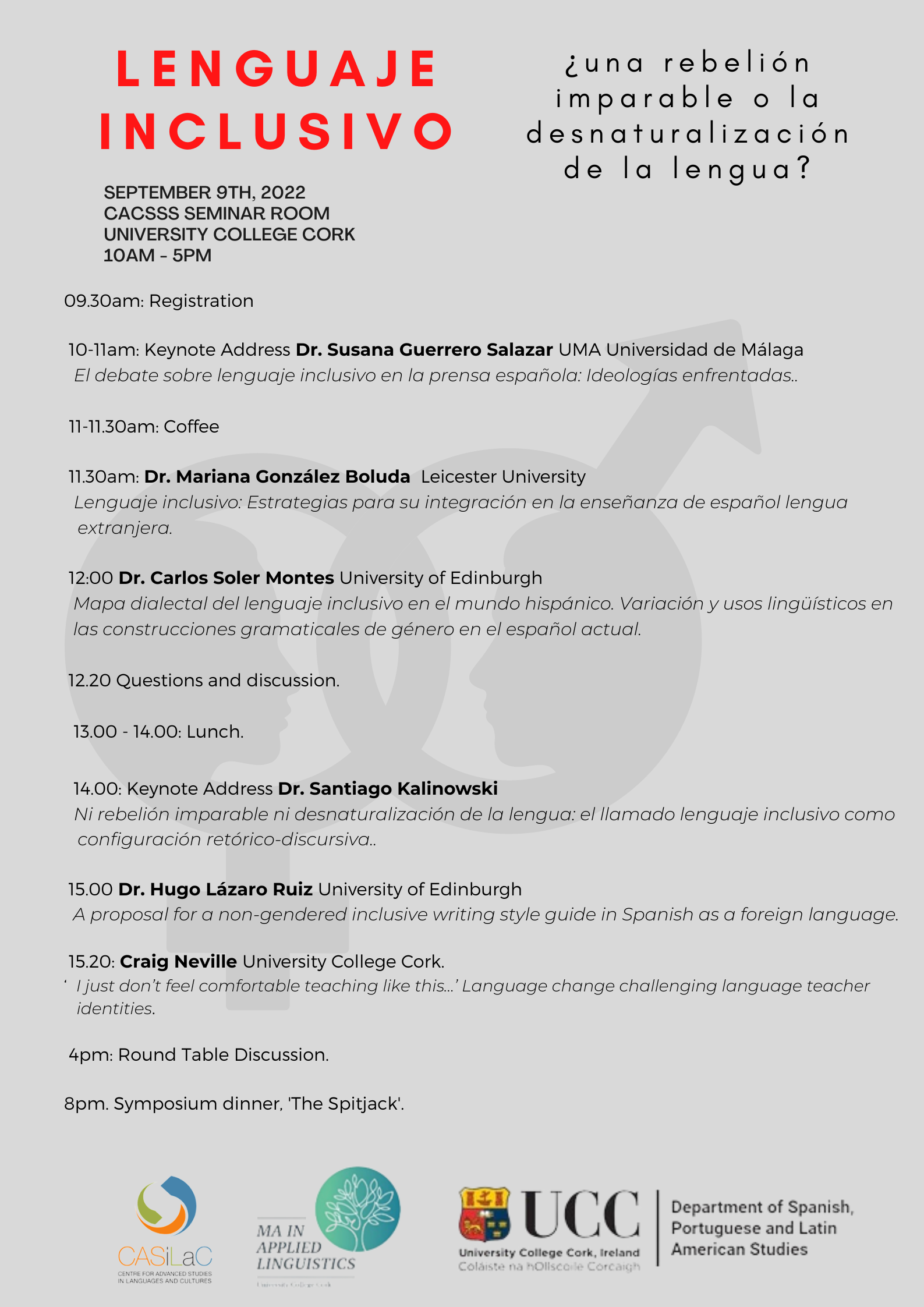INTERNATIONAL SYMPOSIUM “Lenguaje inclusivo: ¿una rebelión imparable o la desnaturalización de la lengua?”
.png)
September 9th – 2022 – University College Cork
The final programme for our symposium can be found below.


Remember that you can register for the symposium using this link.
The emergence of gender-neutral forms in different languages around the world is a relatively new phenomenon. Spanish, with its binary grammar gender system, finds itself at the centre of an increasingly polarised debate on what some see as the sexism inherent within the grammatical structures of the language. Amid the growing visibility of non-binary identities and feminist demands for linguistic equality, Spanish speakers across the globe are experiencing and becoming aware of language change in real time. El masculino incluyente, or, the generic masculine, has become a focus of many of the demands for morphosyntactic change which reflects a more inclusive reality.
In recent years, diametrically opposing points of view have emerged that threaten to undermine the linguistic unity of Spanish. From the implacable opposition of the Real Academia Española to any attempt to change the grammatical structure of Spanish, to the generalized adoption of inclusive, gender-neutral forms of language by some universities in Argentina, the debate has become more divisive and more public.
Hosted by UCC’s Department of Spanish, Portuguese and Latin American Studies, together with CASiLaC and the MA Applied Linguistics, our international symposium will explore the following areas:
Inclusive Language
Sexism in Language
Gramatical gender
Linguistic ideology
Discourse Analysis
Neologisms
The following keynote speakers have been confirmed:
Susanna Guerrero Salazar, Universidad de Málaga
Susana Guerrero Salazar is Professor of Spanish Language at the Universidad de Málaga. Her research has focused on sexism in language across a range of areas, including politics, advertising, administration and colloquial usage. She has conducted specific research, from a critical discourse analysis perspective, on the sports press. In 2016, she was awarded the ‘Premio Nacional de Ensayo Leonor Gúzman’ for her book, ‘La prensa deportiva española: sexismo lingüístico y discursivo’, (The Spanish sports press: Linguistic and discursive sexism’) in which she conducted an exhaustive study revealing the sexism inherent in the discourse of sport reporting. She is currently the director of the DISMUPREN Project, El discurso metalingüístico sobre “mujer y lenguaje” en la prensa española: Análisis del debate lingüístico y su repercusión social.(‘Metalinguistic discourse on ‘women and language’ in the Spanish press: Analysis of the linguistic debate and its social repercussions’)
Santiago Kalinowski, Academia Argentina de Letras
Santiago Kalinowski is a lecturer in Humanities in the Universidad de Buenos Aires and holds a PhD in Hispanic Studies from the University of Western Ontario. Currently, he is Director of Linguistics and Literature at the Academia Argentina de Letras. His primary research focus includes oversight of the Diccionario de la lengua de la Argentina and corpus linguistics. He is also co-director of the Laboratory of Applied Artificial Intelligence, with two research cycles focused on the analysis of online linguistic data, one on the regional lexicón of Argentina and the other on what is known as ‘inclusive language’. He also holds the Luis Contreras Villamayor Chair in the Academia Porteña del Lunfardo and collaborates on various digital media. He is co-presenter of the Linguistics podcast Hablando mal y pronto and is the author of a weekly column on Radio con vos.
Symposium organisers: Dr. Seána Ryan and Dr. María Mondéjar Fuster, Department of Spanish, Portuguese and Latin American Studies
Department of Spanish, Portuguese and Latin American Studies
Contact us
First Floor - Block B East O'Rahilly Building University College Cork Ireland
